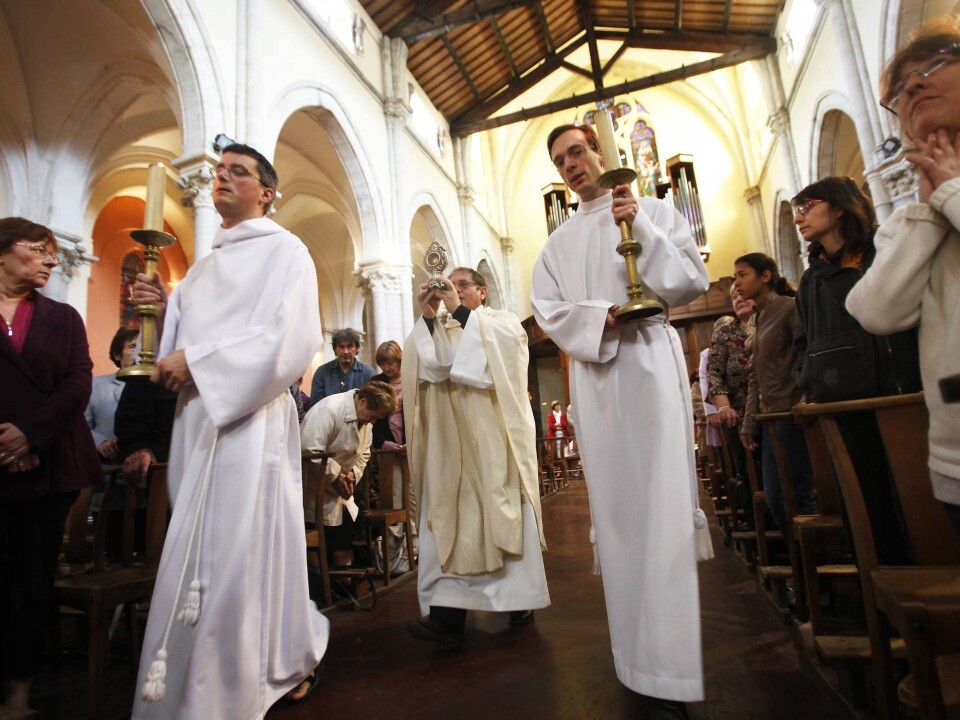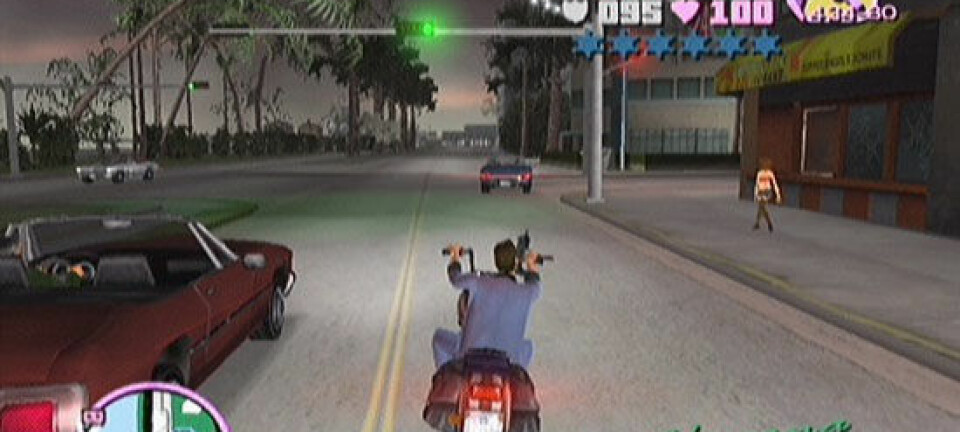
Metaphysics and religion in Scandinavian crime fiction
Since the turn of the millennium, religion and metaphysics have become part of the Scandinavian crime novel. This may be due to a general revolt against the strictly rational and verifiable.
In the novel ‘Fallen Angels’ from 1989, the Norwegian writer Gunnar Staalesen’s protagonist Varg Veum is a trained social worker-cum-private detective who becomes involved in a case where members of a punk band from his youth are assassinated one by one.
One night long ago something happened, and in the first pages of the novel the only surviving member of the punk band, Varg Veum, asks himself if he believes in Jesus.
According to Kim Toft Hansen, an assistant professor at the Department of Culture and Global Studies at Aalborg University, this question is a turning point in the novel. He has recently published a book based on his PhD thesis, entitled ’Murder and metaphysics – The absolute, the spiritual, and the supernatural in crime fiction'.
This marks the first outline of a tendency that has played, if not defined, a major part in the Scandinavian crime novel.
A change in the Scandinavian crime novel

For years the Scandinavian crime novel has functioned as a seismograph of society, where murders are solved in realistic shadows of society and characters may express social criticism. Meanwhile, religious and metaphysical aspects have been all but banned from the Scandinavian crime novel.
Toft Hansen’s own study shows that up until the 1980s there were roughly 10-15 Scandinavian crime novels with religious undertones, while the following two decades saw close to 20, and the period from the turn of the century to the present time has seen 60-70 crime novels that included religion and metaphysics in its pages.
Varg Veum doesn’t answer the question of his own faith immediately. In fact, he only returns to the topic more than 200 pages later, at which point the author has introduced a priest into the narrative, thus offering the protagonist an opportunity to engage in discussions about God, religion and Christianity.
One of Varg Veum’s remarks proves to be almost prophetic when considering what was later to happen in the real world, where religion has once again taken a central place in life:
In the years following TV series like X-Files, which delved into the paranormal, and Twin Peaks, which tended towards the bizarre, and after the new millennium and Dan Brown’s Da Vinci Code, it explodes. A great number of bestselling authors start engaging in the discussion about God and religion in their books, alongside the murder plots
“We live in a time that literally asks for awakening. […] Because a new millennium is an important turning point in the history of human kind and much will happen in the decade leading to its arrival. Because such turning points create anxiety. […] And when man feels anxious, he will seek for comfort outside himself. Some of them name this comfort God. – And it helps,” says Varg Veum in the 1989 novel ‘Fallen Angels’.
Proof of God
In the following years, disaster films depicting pending doom flooded cinemas, showing world plagues while the new millennium was lurking in the horizon and 9/11 exposed abysmal conflicts between devout Muslims and the Western world.
“Staalesen anticipates. In the years following TV series like X-Files, which delved into the paranormal, and Twin Peaks, which tended towards the bizarre, and after the new millennium and Dan Brown’s Da Vinci Code, it explodes. A great number of bestselling authors start engaging in the discussion about God and religion in their books, alongside the murder plots,” says the researcher.
One example of this is the writer Håkan Næsser, who had his DI Gunnar Barbarotti try to solve the mystery of God’s existence alongside the crime plot. This is in line with theologian William David Spencer’s theory that the crime novel is an expression of our longing to search for God.
The main track in the crime novel becomes the socially aware, realistic genre that in Scandinavia develops into a critique of the welfare system. But approaching the new millennium, aspects relating to religion, new age and spiritual movements become more predominant, challenging a modernity that has limited us to rationality and common sense. When modernity limits itself, room is leftover for God
The former parish priest in the Danish Church, Johannes Christensen, says that the crime novel is basically a Christian genre, because it revolves around the idea that all individuals are equal and inviolable, regardless of whether they are a waitress or a king.
Forsaking the irrational
Traditionally, the crime novel steers clear of the metaphysical. It first appears in its original form with Edgar Allan Poe’s ‘Murders in the Rue Morgue’.
“The crime novel arises in the 19th century alongside urbanisation and industrialisation. Because of this, it has traditionally been linked with modern values that are based on the very rationalist, scientific mode of interaction with society. The entire first half of the ‘Murders in the Rue Morgue’ is a description of scientific research. The main track in the crime novel becomes the socially aware, realistic genre that in Scandinavia develops into a critique of the welfare system," says Toft Hansen
“But approaching the new millennium, aspects relating to religion, new age and spiritual movements become more predominant, challenging a modernity that has limited us to rationality and common sense. When modernity limits itself, room is leftover for God."
Beginning of faith in the irrational
The researcher’s views are in line with those of Professor of History of Ideas at Aarhus University Jørgen Schanz, who thinks the self-limiting modernity creates space for the religious and metaphysical aspects.
In his book ‘Modernity and Religion’ Schanz writes that we have previously rejected that which couldn’t be explained with pragmatism or rationality, but that this view is now gradually changing.
“Schanz says that questions such as suffering, sorrow, happiness, death and the mysteries of birth, wondering about existence, and not least evil, are questions that modernity hasn’t been able to provide satisfactory answers to. The same questions, particularly about suffering, death sorrow and evil, are also prominent in the crime novel,” says Toft Hansen.
“I see this self-limitation of modernity that Schanz emphasizes as a possible answer to why the crime novel – as a Western genre product of modernity – now opens a wider discussion of religious and metaphysical topics.”
‘The Girl with the Dragon Tattoo’ a religious novel
The tendency is clear in the Stig Larsson trilogy ‘Millennium’. The criticism of religion stands out in the trilogy books ‘The Girl with the Dragon Tattoo’, ‘The Girl Who Played with Fire’ and ‘The Girl Who Kicked the Hornet’s Nest’.
“There’s a murderer who uses Old Testament quotes. At the same time every part is introduced with statistics about matters such as the number of women who have been threatened by a man. The modern sociological studies of women’s conditions are combined with a critical view on the Old Testament’s presentation of the relationship between men and women,” says the researcher.
Meanwhile, other researchers have pointed out that the protagonist Lisbeth Salander is a Jesus-figure in the books. She is lynched on the front pages of the newspapers and practically crucified on a Good Friday.
“And in the second volume she practically comes back from the dead. I’m not sure that I would go as far as to call her a Jesus figure, but there is without a doubt a play on the Jesus-narrative in the portrait of Salander,” he says.
Toft Hansen refers to the tendency as post-secular crime fiction.
“It denotes the idea that sense and empirical data can accompany that which crosses the boundaries of science.”
-----------------------------
Read the Danish version of this article at videnskab.dk
Translated by: Iben Gøtzsche Thiele







